Top 10 Jobs with High Risk for Substance Abuse Disorders
Substance abuse affects all aspects of a person’s life, including their work performance and employment history. The effects of drug abuse in the workplace can decrease productivity, damage the company’s public image, lower the morale of employees, put workers at risk, and generally hurt the bottom line.
Addiction in the Workplace
Despite the stereotype of the homeless addict, most individuals who misuse substances are actually employed.
The 2013 National Survey on Drug Use and Health found that 76.1% of heavy drinkers, 79.3% of binge drinkers, and 68.9% of illicit drug users over the age of 18 work full or part-time jobs. The rates of employed prescription drug abusers were not included in the study, but can be estimated to be very high as well, considering 1.4 million Americans misused prescription sedatives in 2014, 4.8 million misused prescription stimulants, 5.7 million misused prescription tranquilizers, and 11.5 million—that’s 63.4%—misused prescription painkillers.
Furthermore, 15% of U.S. workers (over 19 million Americans) report using alcohol or being impaired by alcohol at work one or more times in the previous year. Alcohol is the most widely misused drug in the nation, and has the largest impact on the workplace.
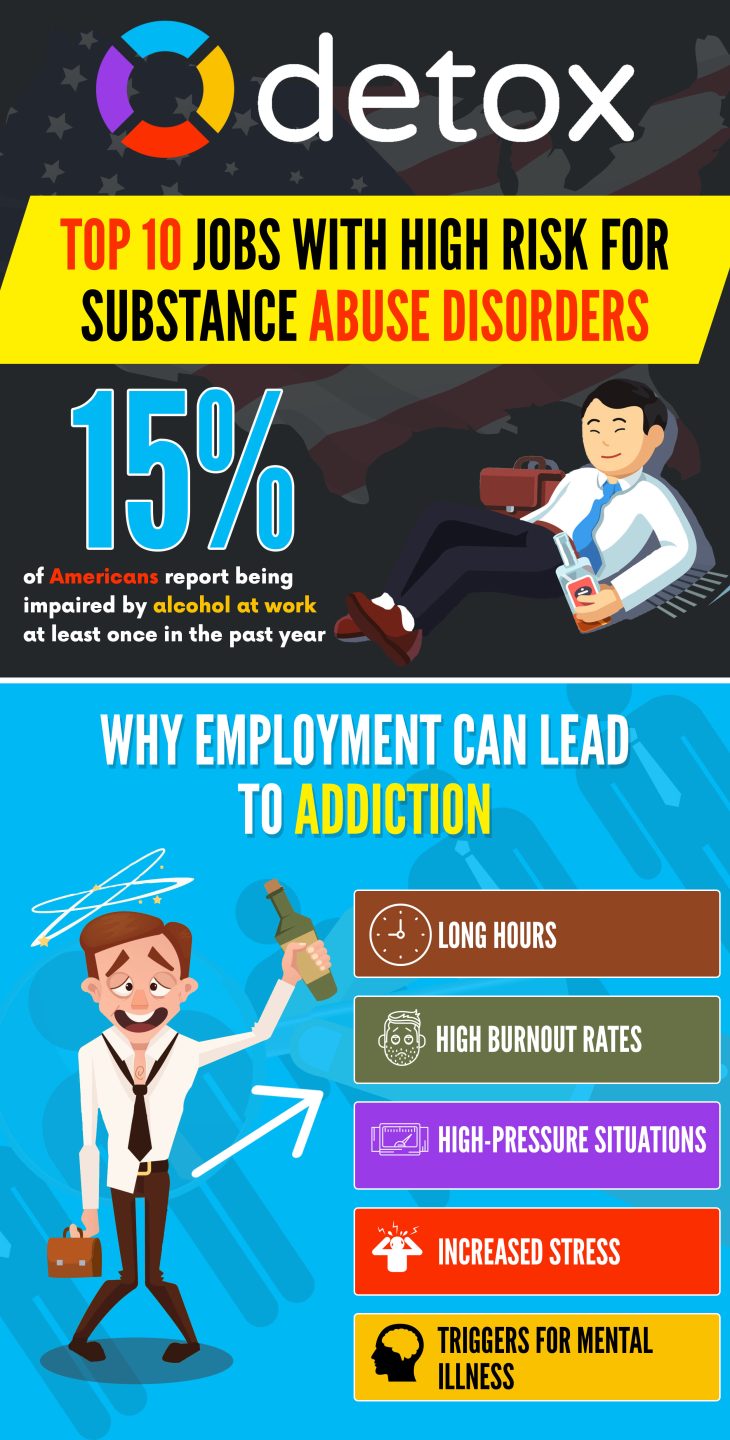
Effects of Drug Abuse in the Workplace
Substance abuse creates a range of costly effects in the workplace, including:
Reduced productivity
Employees who drink at work, drink heavily away from work, or use drugs are more likely to sleep on the job, leave early, take long lunch breaks, and spend work time on non-work activities. Heavy drinkers, even if they only drink off the job, are more likely to argue with coworkers, perform poorly, feel sick at work, leave early or show up late, and miss work altogether.
Increased insurance and healthcare costs
The frequency of workplace accidents among employees who abuse drugs or alcohol is three and a half times higher than employees without substance abuse problems. These and other medical issues cause higher healthcare and insurance costs—twice as much in the case of employees with alcohol problems.
Higher turnover
Americans with substance abuse problems are more likely to report working three or more different jobs in the past year than those without drug or alcohol problems.
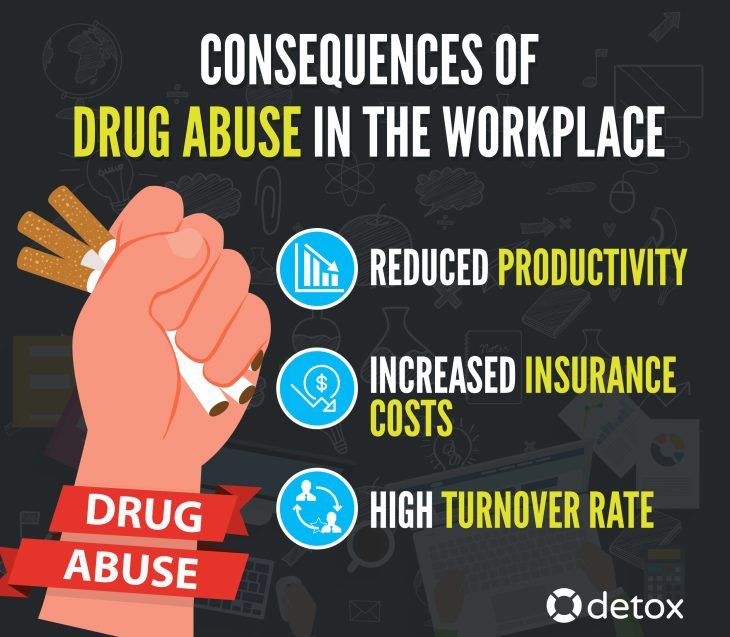
10 Jobs with High Rates of Substance Abuse
1. Construction workers
Most substance abuse among construction workers is for physical reasons. Injuries, ailments related to overwork, and general bone and muscle soreness are prevalent in this industry, making construction workers more likely to be exposed to addictive pain prescription. Many workers to turn to opiates after starting off with a prescription from their doctor. Construction is also high stress due to the pressure of building homes, skyscrapers, highways, and bridges that need to be structurally sound for safety and financial reasons, and construction workers often turn to downers like alcohol and marijuana to cope. In addition, many construction crews have the tradition of drinking together after work, which can easily lead to substance abuse for individuals who are vulnerable to addiction.
2. Doctors, nurses, and healthcare workers
A Medscape study found that 69% of physicians abuse prescription drugs, and 10 to 15% of pharmacists, nurses, and home care workers are addicted to drugs or alcohol. These jobs are very high stress, with pressure to quickly make decisions and perform tasks that could make the difference between life and death for their patients. Most employees in the medical field also work extremely long hours (such as 12 to 16-hour shifts), which could start and stop at any hour of the day or night, disrupting sleep cycles. Rates of burnout and depression are high in the healthcare industry. Easy access to prescription drugs, and a tendency to self-diagnose and self-medicate are also typical in these fields.
Call now to find drug and alcohol detox centers near you!
3. Mining, quarrying, oil and gas extraction
Heavy alcohol use is higher among workers in the mining industry than in any other profession. Part of this may be due to stress, the physical demands and risks of the job, and a workplace culture where drinking is prevalent, but roster systems also play a part. Most miners work long hours for two or three weeks, then take a week off—that much continuous downtime encourages heavy alcohol consumption. The U.S. Mine Safety and Health Administration has various screening, educational, and incentive programs in place to counteract the high rates of alcohol abuse in the industry, but nevertheless, the rates of excessive drinking have continued to rise.
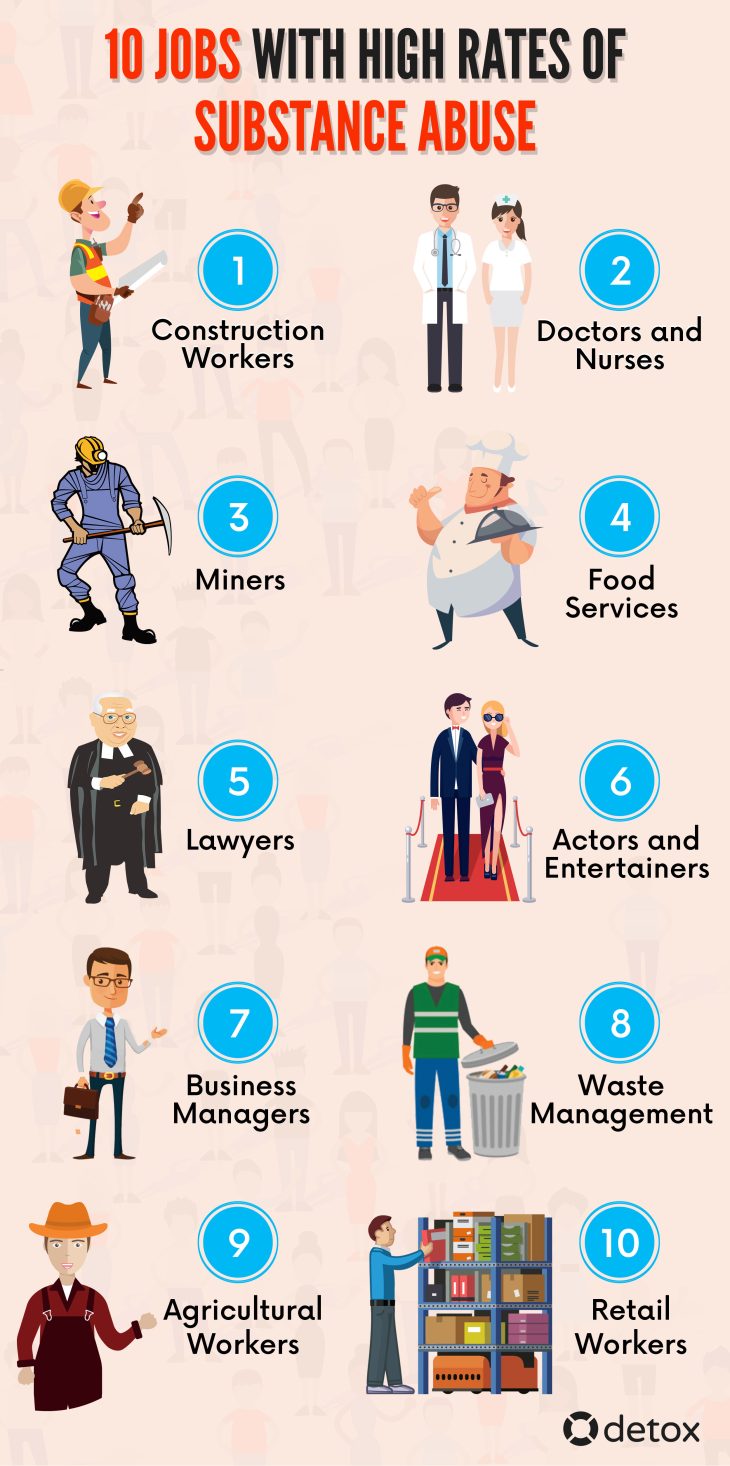
4. Hospitality & Food Service
Jobs in the hospitality and food services industry, including waiters, bartenders, and hotel employees are stressful, and require high-energy, frequent multi-tasking, and quick responses. These employees are regularly asked to meet the demands of impatient and rude customers with a smile. Alcohol is easily accessible in these workplaces, and customers often push drinks on these employees as a way of showing gratitude or to include them in a celebration. Drinking, smoking pot, or taking opiates can be appealing for employees who are stressed and sore after a hard day’s work, and stimulants such as cocaine or amphetamines may be used to maintain energy through long, demanding shifts.
5. Lawyers
Lawyers work in a high stress profession with very high stakes—in business law, a mistake could cost the client millions of dollars, while in the courtroom, a mistake could make the difference between freedom and imprisonment, or life and death. Young lawyers also face stress from the large amounts of debt they usually owe for their education. Problem drinking for stress relief often starts in law school, then continues on the job, where they are expected to work to exhaustion racking up billable hours. There is a culture of drinking in this profession, and lawyers attend lots of meetings where alcohol is served. In their first decade of practice, 29% of lawyers report excessive drinking. By their second decade, 21% suffer from an alcohol use disorder.
6. Entertainment Industry
Although it is the celebrity rehab stints and overdoses that make the news, anyone working in the arts, entertainment, and recreation industry is at a high risk of substance abuse. Employees tend to be young, making them more likely to drink or use drugs, and jobs in the industry tend to be high pressure and unpredictable, with high turnover and long hours. There is also a workplace culture that condones, and at times even encourages, illicit drug use. This combined with the stressful nature of these jobs, the frequent injuries (among athletes, dancers, etc.), and the mental ups and downs of performance and creativity that can lead to widespread depression and anxiety, it should be no surprise that substance abuse disorders are quite common.
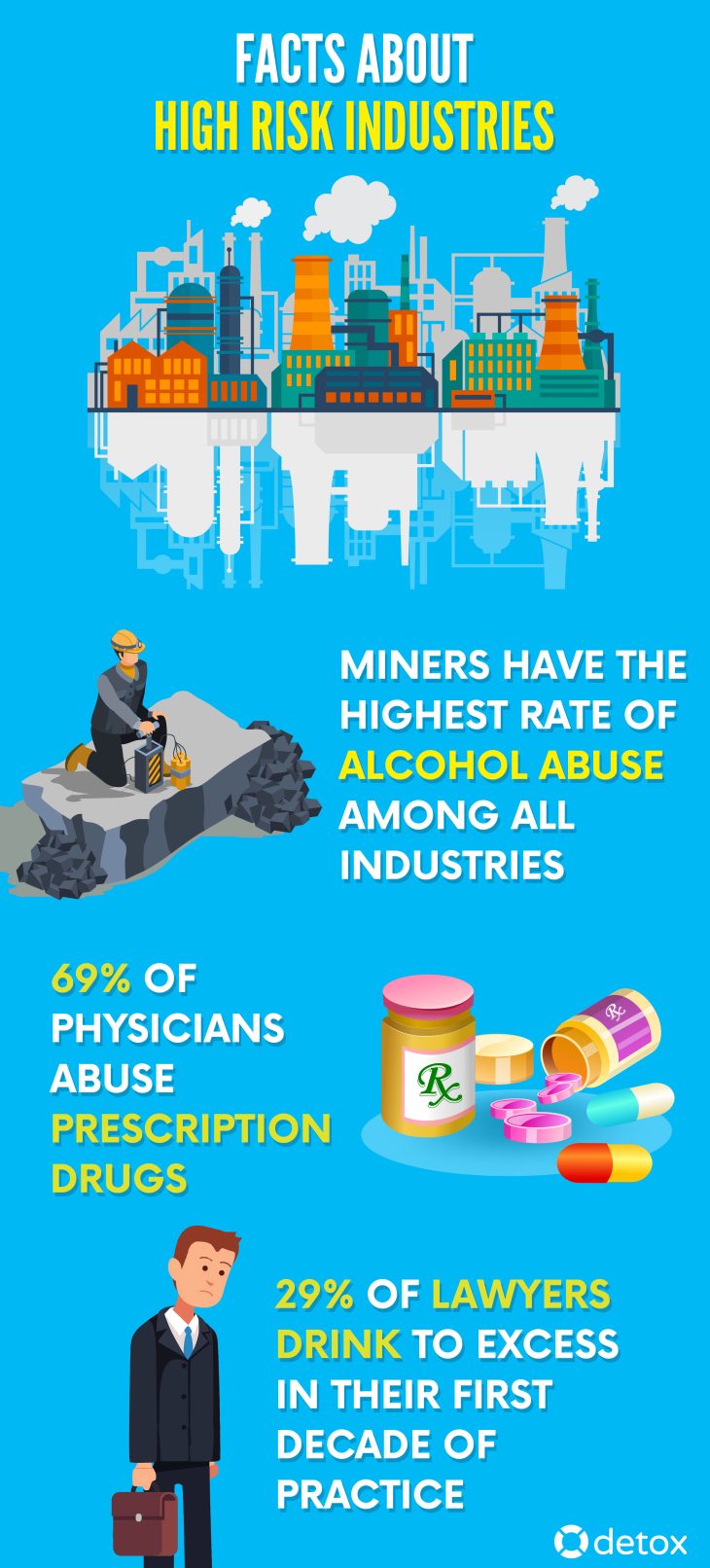
7. Management
Studies have shown that people with higher incomes suffer from significantly higher rates of substance abuse than people with lower incomes, probably due to having more disposable income. Management jobs tend to be higher paying—and they also tend to be higher stress, with a range of challenges related to employees and profitability, and a lot of pressure to prove that the work they do results in positive outcomes for the company.
8. Waste Management
Workers employed by waste management and remediation organizations, security companies, travel agencies, and employment agencies suffer a higher rate of substance abuse than the general population. This is most likely due to low wages, sporadic hours, workplace culture and poor working conditions. Cleaning and waste disposal, collections, customer service, and other jobs in this industry are often stressful, unpleasant, and subject to an unfortunate lack of respect, causing many to turn to alcohol and drugs to self-medicate depression and anxiety.
Drug abuse can lead to unemployment. Get the help you need today!
9. Agriculture, forestry, fishing and hunting
Isolation, repetitive tasks, and long spans of time spent away from home and family make depression very common in the farming, forestry, hunting and fishing industry. Physical labor can also lead to increased physical complaints and injuries, much like in the construction industry.
10. Retail and Wholesale Trade
Depression and substance abuse are widespread in the sales profession. For some this is due to irregular hours, low pay, or the fact that income is often dependent upon results that can be unpredictable and difficult to control. For others, there is constant travel that is lonely and emotionally draining. These also tend to be high-turnover positions with younger employees. Substance abuse in this industry is spread across all categories of drugs—marijuana and alcohol are frequently abused for stress relief, and amphetamines and cocaine are often used to boost energy and mood.
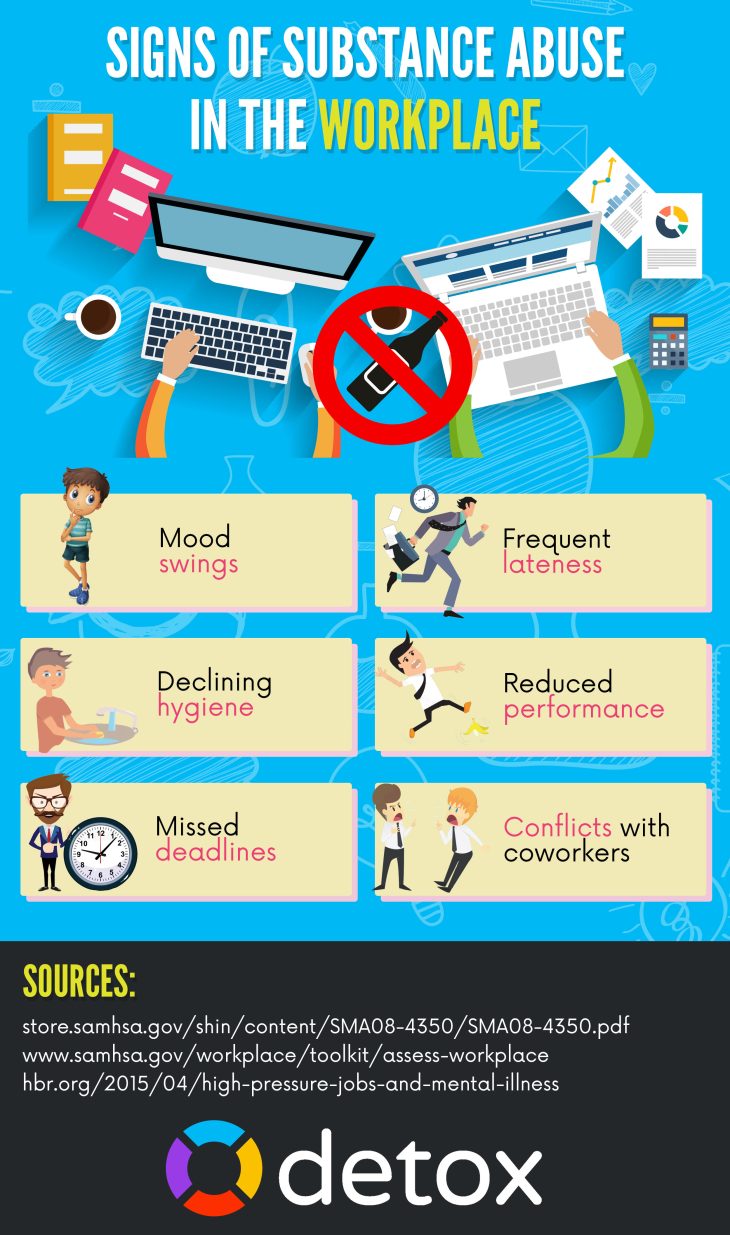
Signs of Workers Suffering from Addiction
The negative effects of drug abuse in the workplace are profound, making it extremely important for employers to learn how to identify workers suffering from substance abuse issues.
Signs of addiction include:
- Defensiveness about the substance of abuse
- Unusual patterns of behavior
- Frequent conflicts with coworkers
- Withdrawing from professional responsibilities
- Changes in attitude and unexplained mood swings
- Changes in grooming and appearance
- Declining performance, carelessness
- Frequent lateness and absenteeism
How to Help Workers Suffering from Addiction
The first consideration for helping employees with substance abuse problems is to make sure the workplace provides adequate insurance coverage and an Employee Assistance Program that offers counseling and/or referrals to peer support/addiction recovery groups, rehabilitation programs, and other forms of addiction treatment.
Second, try to create an atmosphere of openness that allows employees to feel safe letting others in the workplace know that they are receiving or are in need of substance abuse or mental health treatment. Make sure that employees feel that they can report the substance abuse of their coworkers and have it result in that coworker getting help instead of receiving punishment or getting fired.
Hand in hand with this atmosphere of openness should be a culture of respect that supports employees with substance use disorders and understands that addiction is a disease, and not a choice. Employees can recover and become valuable assets to the workplace with the appropriate substance abuse treatment.
Toll-free
800-671-4304
Call Now
Substance Abuse Treatment for Professionals
Many employees, especially professionals in high pressure jobs, think they don’t have time for addiction treatment, and all kinds of employees fear that they could lose their job if they seek out addiction treatment. Making sure that employees understand that flexible treatment options are available, and that employers are willing to not just be understanding about treatment, but facilitate it on behalf of the employee, will make sure that workers get the substance abuse treatment that they need—from detox, to counseling, to aftercare.
There are also specialized treatment programs that cater to certain professions, such as rehab programs for doctors, nurses, and other employees in the healthcare industry, and programs for lawyers, CEOs, and other high-ranking professionals. All substance abuse treatment is required by law to be confidential, but these programs take extra steps to ensure the privacy of their clients, such as allowing cash payments. They may also offer video conferencing and other business resources to allow executives to work while receiving inpatient treatment, and for outpatient treatment, counselors may provide patients with therapy sessions by phone or video, so counseling can be more easily worked into a busy schedule.
Get the Help You Need
While a person who is vulnerable to substance abuse due to a family history of addiction or mental health issues should ideally avoid professions that are high risk for substance abuse disorders, this isn’t always possible. Sometimes you have to work the job you can get, or maybe your dream job happens to have a culture of drug or alcohol abuse. What matters most is to recognize when you need help and to take advantage of any workplace resources that may be available to help you in your recovery.
Even if your workplace is not supportive of addiction treatment, remember that the physical, emotional, and financial toll of not getting treatment is much larger than the possible cost of taking time off work to get help. Recovery can not only improve your health and state of mind, it can open doors to opportunities that will improve your professional life as well. Call 800-996-6135 to find the right treatment program for your recovery needs.

